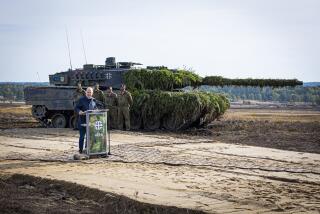PERSPECTIVE ON THE PERSIAN GULF : Main Head Should Go Here
- Share via
The precedents we set in dealing with chemical warfare here and now can have a strong influence on how the continuing proliferation of these weapons plays out.
The first precedent that must be--and apparently is being--set is to make sure that the threat of chemical warfare does not deter decisive action to roll back the Iraqi invasion of Kuwait. If it does, similar threats in the future will be seen as effective means for locking in ill-gotten gains.
If Saddam Hussein does employ chemical weapons, it will be important to quickly retaliate at comparable or greater levels of violence, but our retaliation need not be identical in character. The coalition facing Iraq has enough conventional military power to reduce that country to rubble. If at all possible, the use of chemical or nuclear weapons should not even be considered, except in the unlikely event that our circumstances become desperate. We should retain the moral high ground and minimize the legitimacy of actually using these weapons.
A most valuable precedent will be set if the coalition can retain its unity in the event of a chemical weapons attack and speed its efforts to defeat Iraq. If the net effect of chemical weapons is to bring down the entire world’s wrath on Iraq, the perceived usefulness of chemical weapons will be undermined, and the incentives for further proliferation of these weapons reduced correspondingly.
We have been accelerating toward a world in which dozens of nations would own chemical and nuclear weapons. If the current crisis plays out in such a way as to undermine the perceived utility of chemical weapons, the long-term prospects for a world at peace will be brightened considerably.
More to Read
Sign up for Essential California
The most important California stories and recommendations in your inbox every morning.
You may occasionally receive promotional content from the Los Angeles Times.










